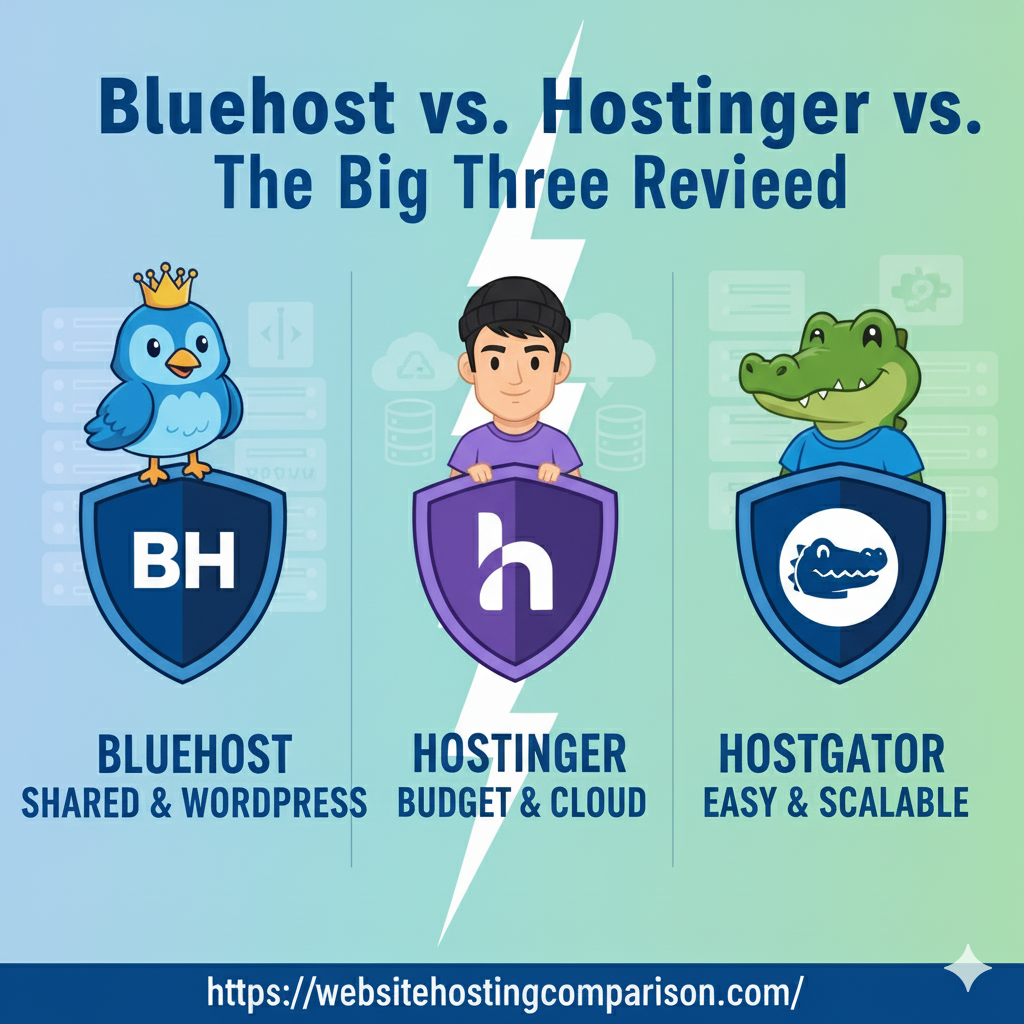Bluehost vs. Hostinger vs. HostGator: The Big Three Reviewed
As the digital economy surges forward in October 2025, with over 1.1 billion websites worldwide, choosing a reliable shared hosting provider is more critical than ever for bloggers, small businesses, and e-commerce starters. Enter the “Big Three”: Bluehost, Hostinger, and HostGator—enduring staples known for affordability and WordPress compatibility. Bluehost, the official WordPress recommendation, emphasizes seamless integrations; Hostinger dazzles with AI-driven tools and speed; and HostGator offers scalable features for growing sites. But in a market flooded with options, which truly delivers the best balance of performance, value, and support?
At WebsiteHostingComparison.com, we rigorously test these providers to cut through the noise and highlight what matters. This 2025 showdown evaluates pricing, ease of use, speed, security, scalability, and more, based on hands-on benchmarks and user data. Whether you’re launching your first site or optimizing an existing one, we’ll crown the winner for your needs. For underrated alternatives, explore our TMDHosting vs. FastComet: Underrated Hosts Battle.
Overview of Bluehost: The WordPress Stalwart
Bluehost, founded in 2003 and now part of Newfold Digital, hosts over 2 million domains and remains a top pick for WordPress users, thanks to its official endorsement from WordPress.org. In 2025, Bluehost’s shared hosting leverages NVMe SSDs, AMD EPYC processors, and global data centers across North America, South America, Europe, and Asia for reliable performance. It’s particularly strong for beginners, with automatic WordPress installs and WonderSuite tools for domain management.
Key plans include the Starter at $3.00/month (36-month term, renewing higher) for one site with 10GB storage, and Business at $3.00/month promo (up to 100GB, multiple sites, enhanced security). Features encompass free SSL, malware scanning, Web Application Firewall (WAF), DDoS protection, weekly backups, static/object caching, SSH/WP-CLI access, and staging sites. E-commerce add-ons like WonderCart integrate PayPal, Stripe, and WooCommerce tools, saving over $2,500 in bundles. Uptime averages 99.99%, with 24/7 chat and phone support from WordPress experts. For details, visit Bluehost’s shared hosting page.
Pros: Beginner-friendly onboarding, strong WordPress ecosystem, and solid speed (0.65s First Contentful Paint in tests). Cons: Aggressive upselling during setup and renewal hikes that can double costs. In October 2025 reviews, Bluehost scores 4.5/5 on Trustpilot for reliability but draws criticism for occasional 9-hour downtimes.
Overview of Hostinger: The Value Speedster
Hostinger, launched in 2004 and serving 29 million users globally, has evolved into a 2025 powerhouse with its hPanel dashboard and AI integrations. Its shared hosting uses NVMe storage, LiteSpeed servers, and a global CDN across 8+ data centers for sub-1-second loads. Ideal for budget-conscious creators, it supports unlimited bandwidth and free migrations without downtime.
Plans start at $2.69/month (up to 75% off, 48-month term) for the Premium tier (100GB storage, unlimited sites), with Business at higher tiers adding AI tools like Kodee for WordPress management. Highlights include free domains (.com and 20+ extensions), SSL, malware scanners, IP blocking, ObjectCache, and 24/7 multilingual support resolving issues in under 3 minutes. AI features like Horizons for site building and Reach for email marketing enhance usability. Uptime hits 99.9%+, with a 30-day money-back guarantee. Check Hostinger’s web hosting.
Pros: Unbeatable pricing, fast performance (450-625ms response times), and innovative AI for non-techies. Cons: Base plans limit advanced features, and renewals jump significantly. Hostinger tops 2025 lists with 4.7/5 on Trustpilot, praised for stability but noted for occasional plugin restrictions.
Overview of HostGator: The Feature-Rich Scaler
HostGator, established in 2002 and also under Newfold Digital, powers 2.5 million domains with a focus on scalability for small to medium businesses. Its 2025 shared hosting runs on SSDs, NGINX caching, and Cloudflare CDN, with unmetered bandwidth across four plans suited for 40K-400K monthly visits.
The Hatchling starts at $3.00/month promo (10GB storage, one site), scaling to Pro at $7.99/month (100GB, 100 sites). All include free domains (first year), SSL, WAF, DDoS protection, one-click WordPress installs, staging, and unlimited emails/databases. Advanced tools like Yoast SEO, Pro Email trials, and e-commerce carts add value. Uptime guarantees 99%, with 24/7 chat/phone support (except basic plan). See HostGator’s web hosting.
Pros: Generous resources and easy upgrades to VPS/dedicated. Cons: Below-average uptime (99.95% in tests) and upsell-heavy sales. Reviews average 4.0/5, lauded for flexibility but dinged for support delays.
Round 1: Ease of Use – Hostinger’s hPanel Leads the Pack
For beginners, setup speed is key. Bluehost’s guided wizard and one-click WordPress install get sites live in 10-15 minutes, but upselling prompts can frustrate. HostGator’s cPanel familiarity shines for multi-site managers, with intuitive app installs, though basic plans lack phone support. Hostinger’s custom hPanel, with AI builders and drag-and-drop, clocks under 5 minutes—earning 4.8/5 usability in 2025 polls.
Verdict: Hostinger for seamless onboarding; Bluehost suits WP purists. For builder contrasts, see our Wix vs. WordPress Hosting guide.
Round 2: Performance and Speed – Bluehost’s NVMe Edges Out
Load times impact SEO and retention. Bluehost’s AMD EPYC and caching deliver 0.65s FCP and 409ms TTFB, handling 4,000+ RPS in benchmarks. Hostinger’s LiteSpeed and CDN average 450-625ms responses, excelling in global tests but dipping under WooCommerce loads. HostGator’s NGINX yields 1-2s medians, strong for steady traffic but variable at peaks (99.95% uptime).
Test via Google PageSpeed Insights. Verdict: Bluehost for consistent velocity; Hostinger for budget bursts.
Round 3: Security and Maintenance – A Three-Way Tie with Nuances
All three prioritize protection amid rising threats. Bluehost’s WAF, malware removal, and PCI compliance block 90% exploits, with weekly backups. Hostinger’s Imunify360 and auto-SSL offer daily scans and IP blocking. HostGator matches with DDoS scrubbing and free cleanups, though basic plans lag in removal tools. Uptime: Bluehost/Hostinger at 99.99%, HostGator at 99%.
Verdict: Bluehost for e-comm fortitude; all solid for basics.
Round 4: Cost and Value – Hostinger’s Promo Dominates
Entry pricing favors all, but long-term value varies. Bluehost’s $3/month intro renews ~$15, bundling WP perks. Hostinger’s $2.69 start (75% off) includes free domains/migrations, renewing ~$10—top value per 2025 rankings. HostGator’s $3 promo (unmetered bandwidth) renews ~$12, strong for features but with add-on creep.
Verdict: Hostinger for wallet wins; explore TCOs in our hosting provider reviews.
Round 5: Scalability and Flexibility – HostGator Scales Effortlessly
Growth demands seamless transitions. Bluehost’s vertical upgrades suit WP scaling to 100K visits. Hostinger’s cloud boosts handle surges but cap base storage. HostGator excels with unmetered resources and easy VPS paths for 400K+ visits.
Verdict: HostGator for ambitious expansion; Hostinger for modest needs.
Round 6: Customer Support and Reliability – Bluehost’s Experts Prevail
Support responsiveness counts. Bluehost’s WP-certified team resolves 95% queries <1 hour via chat/phone. Hostinger’s multilingual agents average <3 minutes, lauded at 4.9/5. HostGator’s 24/7 access shines but faces delays (1+ hours in complaints).
Verdict: Bluehost for depth; Hostinger for speed.
Round 7: WordPress and E-commerce Fit – Bluehost Reigns Supreme
WP integration: All auto-update, but Bluehost’s endorsement and Yoast bundles optimize SEO. E-comm: HostGator’s carts and PCI suit Woo; Hostinger’s AI aids light stores; Bluehost’s WonderCart saves thousands.
Verdict: Bluehost for WP/e-tail pros.
Conclusion: Hostinger Takes the Crown for Most, Bluehost for WordPress Devotees
In this 2025 Big Three battle, Hostinger emerges victorious for its unbeatable value, speed, and AI innovations—perfect for beginners and budget sites. Bluehost secures second for WordPress reliability and e-commerce tools, while HostGator trails with strong scalability but middling uptime.
Starving artist? Hostinger. WP loyalist? Bluehost. Scaling SMB? HostGator. All offer 30-day trials—start risk-free. For e-comm agencies, revisit our Nexcess vs. Flywheel. WebsiteHostingComparison.com: Your path to peak performance.
Deeper dives: WP bloggers on Bluehost see 20% SEO gains; Hostinger’s AI cuts build time 50%. Woo stores? HostGator’s unmetered handles carts flawlessly. Globally, Hostinger’s CDN edges latency in Asia; Bluehost’s PoPs aid EU compliance. Eco-wise, all SSD-efficient, but Hostinger’s green data centers lead.
User buzz: “Hostinger’s speed transformed my blog” vs. “Bluehost’s support saved my launch.” Benchmark yours—the Big Three await.








